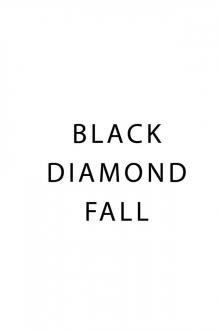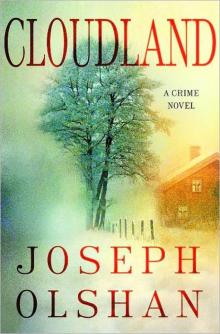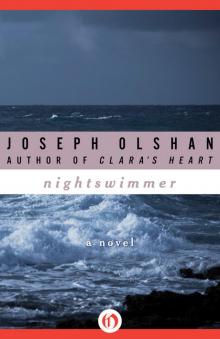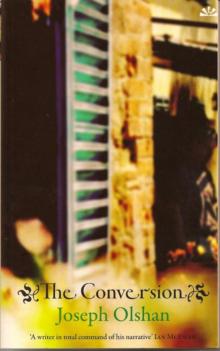- Home
- Joseph Olshan
Cloudland Page 2
Cloudland Read online
Page 2
I automatically ordered scrambled eggs, knowing I’d probably have no appetite. Since discovering Angela Parker’s body I often felt queasy whenever I smelled food, imagining her gelid gray flesh, what little blood that remained in her body frozen in her veins, its deep rusty stain like Italian ice in the orchard’s snow, her neck purpled from strangulation.
Combing his thick, shiny auburn hair out of his eyes, Anthony said, “I guess I should have realized you’d have to receive people here. Hope that’s not too uncomfortable for you.”
“It’s okay. I actually appreciate all this concern. Let’s face it, everybody is freaked out.”
Glancing around the room, Anthony said softly, “I asked both of you to lunch to let you know that I’ve begun working on all the cases, going over the evidence that has come in.”
We stared at him for a moment and then Paul said, “Working on the cases? I thought you were down in Springfield dealing with all the schizos.”
“Do you know anything about forensic medicine?” I challenged.
“Back in New Brunswick, forensic psychiatry was one of my specialties. I offered to work on these murders when I heard Dr. McCarthy”—he paused respectfully—“was unable to.”
We’d all heard that Dr. McCarthy, Windsor County’s forensic psychiatrist, had been diagnosed with Alzheimer’s. Anthony turned to me. “The police don’t want anyone to know I’m working for them until I get up to speed.”
“So you invited us here to tell us to keep our mouths shut,” I pointed out.
“No, just a request. I’m actually concerned about how everybody is doing.” Anthony was looking meaningfully at Paul, a short and gnomelike seventy-five-year-old with prominent, questioning blue eyes. “Let’s face it, the two of you, Wade, my family, and myself are the only full-time residents on Cloudland. It’s pretty desolate up where we live. The perfect place to leave a body that won’t be found for a good while.”
There was a gnawing silence between the three of us. Finally, I said, “So you’re working with that guy Prozzo?”
“Directly.”
“He seemed to know me.”
“I’ve spoken of you. He told me his wife and his daughter read your column. Anyway, Marjorie Poole, the woman who got away from our killer last year, is a bellwether.” Anthony was speaking of the only woman attacked who’d managed to escape. “Most of the other women were pretty badly decomposed by the time they were found, whereas Angela was frozen for nearly three months. The strangle marks on her neck and Marjorie’s are pretty identical, as well as the stab wounds. It’s a certain kind of knife.”
“A filleting knife,” I said. “Deep-sea fishermen use them.”
“So could he be a fisherman who came inland?” Paul asked. He was looking at me oddly. I’d been inadvertently tracing my finger along a scar on my neck. The moment I realized he was peering at me I could actually feel the pressure of sadness that had been chasing me for the last two years, reliving the alarm of having my windpipe blocked, my breathing thwarted by a man I loved.
“It’s a common enough knife, really,” Anthony said, adding that as in the other murders, there had been no handling that suggested sexual intent; and that this could mean the killer himself was sexually impotent.
“One thing that continues to amaze me,” I said, “is that Marjorie Poole has been such a terrible witness. You would think she’d be able to give enough detail so that they could nail this guy.”
Anthony looked from one of us to the other. The rolled-up sleeves of his shirt had slipped down his forearms, which were covered with golden hair. As he rolled them up again, he said, “I’ll explain, but once again, it can’t go beyond this table.” He looked around to make sure our waitress, an inveterate gossip named Sheila, was out of earshot.
He reminded us that Marjorie Poole, a twenty-seven-year-old potter, had been attacked outside her studio loft in Claremont, New Hampshire. At seven o’clock one winter evening, carrying two plastic bags of groceries she’d been keeping in a small refrigerator, Marjorie began heading along the row of deserted offices and studio spaces. The building had originally been a wool mill, whose oak floors creaked and sighed when you walked along them and whose ceilings rose high up into an industrial cathedral. Out of the corner of her eye she claimed to have seen a densely built man sitting on a bench in front of one of the refurbished offices. Head in his hands, he was wearing a camouflage army jacket and a Boston Red Sox baseball cap. She sensed an air of distress about him and almost stopped to ask what was wrong. But a glance down the long, empty corridor was enough to make her wary. Later on she swore that he never looked up at her, that she’d never been able to see his face very clearly. A few moments after she passed him, he leapt off the bench and attacked her from behind, jamming his jacket sleeve into her mouth.
He ringed her throat with fingers encased in woolen gloves. Then she felt a sharp, stupefying pain in the small of her back; he’d pulled up her soft down jacket, her striped jersey, and found bare skin. That winter Marjorie Poole had been going to a tanning parlor in West Lebanon, in anticipation of a holiday with her boyfriend in the Lesser Antilles. There was a tan line between her lower back and the top of her buttocks that was adorned with a discreet shamrock tattoo. With his long blade, the killer aimed for it, and the knife drove in halfway, piercing the shamrock, just missing her spleen, the tip barely nicking the wall of her bladder. She managed to backhand him with a grocery bag lined with large pouches of frozen strawberries, striking him forcefully on one side of his head, stunning him into momentary submission. He let go of the knife and she foolishly but instinctively reached around and yanked it right out of herself. While she bled her pain distilled into fury. She took a savage lunge between the flaps of his camouflage jacket, jabbing an inch into his gut, mixing her blood with his before fleeing and, unfortunately, leaving the knife behind.
Anthony leaned forward. “What you don’t know is that Marjorie Poole was high when she ran into this guy.”
“How high is high?” I asked.
“They found traces of cocaine and Vicodin and alcohol in her blood.”
“That’s really high,” I agreed.
“She was so high that she couldn’t really give the police any details about his face or how old he looked.”
“So that’s what it was,” I said. “Not traumatic memory loss.”
“Correct.” Anthony leaned back and crossed his arms over his chest. “But here’s the thing,” he said. “Being high probably saved her life. In medical school they say, ‘God protects the inebriates and the babies…’ Basically she was too stoned to panic. And really fought back hard with everything she had. Even though she couldn’t give us any particulars about his face or his age, she does remember one very significant thing.” Anthony paused, scrutinizing Paul and then me. “When he was trying to kill her he told her about ‘The Day of Judgment’ and that she’d sleep until then. And when she was on the way to the hospital, they found a few Seventh-Day Adventist pamphlets shoved into the pocket of her peacoat.”
“And the connection?” I wondered aloud.
Raising his ginger-colored eyebrows, Anthony said, “It hasn’t been reported and it won’t be reported, I don’t think, but a similar pamphlet was actually found in Angela Parker’s ski jacket.”
Shuddering, I said, “What about the rest of the women?”
“We’re checking through the files, but as far as I can see, nothing like this has been linked to any of the other bodies. But we have to take into consideration that every other victim was killed when it was warmer, so the bodies had decomposed and were picked over by animals by the time they were found. Had it been left, printed matter might have been scattered.”
“Or depending on the weather, decomposed or dissolved in the elements,” said Paul, who, being an artist, knew about the durability of paper.
“How about the one killed in her home?” I said.
“Janet Tourvalon?” Anthony said. I nodded. “Nothing printed
found anywhere near her. However.” He held up a finger. “Everything else matches, the strangle marks, the knife wounds.”
“Maybe he found God and His literature more recently,” said Paul, a lapsed Catholic.
“I think he’s just trying to mix it all up, red-herring style,” Anthony said.
“Or maybe just getting bolder,” I said, “and taunting us with clues.”
Sheila, our waitress, arrived with more coffee and refilled Anthony’s cup and mine. “Whatya up to these days?” she said to everyone. “You doing all right, honey,” she addressed me, and then was uncharacteristically direct for a Vermonter. “Talk about one crazy day, going for a walk and finding a stiff in the snow!”
“Not one of my better ones.”
She grimaced. “I can only imagine.”
Sheila was a tough-talking, rail-thin blonde who was rumored to have been a partner in a crystal meth lab that was run out of an auto body shop attached to an old, degraded farmhouse. The local scuttlebutt claimed that she was out of town when the operation was raided and shut down.
Glancing at Paul, who knew her a lot better than Anthony, I said to Sheila, “I’m coping. And you?”
“Oh, keeping my thoughts and deeds pure,” she said with a saucy smile. “Be a lot happier when the weather perks.” We all reflexively glanced out the window across the parking lot and past the drive-up bank teller to a short field where the snow had melted down to stubbled grasses that were a monochrome, mud-seasonal brown. “Dreary, isn’t it?” Sheila remarked. I looked back and saw her winking flirtatiously at Anthony, who waited until she drifted over to the next table of customers.
“I think she likes you,” I said.
Ignoring my remark, Anthony said sotto voce, “Angela Parker was an atheist … according to her husband.”
“Well then, slim chance she’d be carrying around inspirational literature in the pocket of her ski jacket,” said Paul, who tore his last piece of toast in half and tossed it on his plate. He unfolded his paper napkin and laid it on top so that it spread over his unfinished omelet like a funeral shroud.
* * *
On the way out of the restaurant, Paul stopped to chat with our local state representative, who was dining alone at the counter. As Anthony and I walked to the parking lot, he asked how I’d been feeling day to day. “You’re looking a bit slimmer than your usual svelte self,” he said.
I told him I’d scarcely eaten in the seventy-two hours since I’d found her, my thoughts still hounded by visions of pink parkas, a lacerated neck, and melting ice on her forehead.
I told him that over and over again I’d been imagining myself in my last day of life, leaving my family for an outing with friends, the ozone smell of snow in early hours, sweet wood smoke, the feeling of a solitary adventure on the horizon, driving with my skis in the back of the car, and then, after a long day on the slopes, legs and thighs burning from all the exertion, heading home cozy and warm as the snow begins to ping the windshield. I’m gripping the steering wheel tightly, peering out into diminished visibility, holding the road carefully, afraid of veering off the highway, just wanting to make it back to my family safe and sound.
“I feel disconnected and vague,” I admitted. “All the time. I usually have trouble sleeping. Now it’s worse than ever.”
“Do you take anything for it, the insomnia?”
“On and off. Basically just live with it. Stay up late at night reading.”
Raking his heel across a loose patch of gravel as though to get a cake of mud off of it, Anthony said, “I’m surprised Breck hasn’t offered to come and visit.”
My daughter was living five hours away in New Jersey. I hadn’t seen her since early January. “Breck’s caught up in her girlfriend right now,” I explained with a pang of missing her. “But she calls fairly frequently. When I told her what happened she offered to come … halfheartedly.”
He fixed his pale eyes on me. “Why don’t you drop by the house. I’m happy to give you a script … for your sleep.”
I hesitated.
“Seriously. When is good for you? How’s tomorrow morning?”
“Tomorrow morning’s fine.”
“Come by around…” He thought a moment. “Ten o’clock.… Now, just one more thing, Catherine,” he said, looking toward Paul, who was standing well out of earshot. “You’re not going to write about anything we spoke of, are you?”
This puzzled me; he was well aware that I no longer did investigative journalism.
“I never knew you gave that up forever,” Anthony said when I reminded him.
“Never say forever … but for the most part, anyway. Not that I think that you read my columns, but FYI: the only thing that might be usable from what you told me would be ‘how to stop a killer with a bag of frozen strawberries,’ which I honestly think my syndicate editors might sneer at.”
He laughed and then said, “I know you’ve done a lot of true crime reporting. And I know you’ve been following this investigation.…”
“Meticulously,” I told him.
“I’d like to be able to discuss … certain findings with you from time to time to get your take on things.” Glancing at the restaurant, where Paul was just beginning to make his way toward us, Anthony said, “I think you could be helpful to me. But it would just have to be between us. And there will be certain things that I might not be able to divulge.”
“I understand. I’d be happy to assist.”
“Great.” He gave me a bone-breaking hug, approached Paul and squeezed his shoulder, then trotted off to his red pickup truck.
Paul and I climbed into his vintage Saab and drove a mile homeward down Route 12 as it opened onto a piebald landscape of snow and brown. It was April 1, still many weeks away from any hint of green.
“You’re awfully quiet, dearie,” he said to me.
“That’s because I’m feeling queerie.” I managed to smile.
“How come?”
“I keep thinking about her, poor soul.”
“Angela, you mean?” Paul said.
“Of course Angela! I’m sorry, I don’t mean to sound so impatient.”
“It’s okay … Oh now, Jesus!” Paul exclaimed, and pulled over to the side of the road.
“What’s wrong?”
“I forgot to pick up a dozen eggs.”
“You just had them … for breakfast.”
“Not for eating,” he snorted. “For mixing tempera.”
Then something occurred to me. “Tell you what, leave me at Wade’s office, go get your eggies, and I’ll make Wade give me a ride home.”
“Fine,” Paul said, but then went ruefully quiet as he carefully made a U-turn and drove us back toward Hartland Three Corners. “When you go in there, tell my…” He hesitated and then said, “Son he owes me a call.”
“Before I leave, I’ll pick up the phone and I’ll put it in his hands.”
Paul finally stopped the car in front of the town clerk’s office, turned to me, and said, “I was watching you while Anthony was talking. I saw you touch your neck like that.”
“Yeah?”
“Well, of course I was wondering—”
“I figured you were wondering.”
“That boy,” he said with a dismissive tone.
“Yeah, I was thinking about that boy,” I said with the bitter taste of longing.
“Still away, though, isn’t he?”
“Yup. Says he’s never coming back.”
“I certainly hope that’s true.…”
“You do, huh?”
“I hope you do!”
I didn’t answer.
THREE
HE WAS A STUDENT OF MINE who strategically waited until the class was over before approaching me. I used to call him a boy; however, he was very much a man in every way except perhaps in his unbridled idealism. And I guess in the end that idealism came between us but it didn’t kill us. Youth that is as yet unbroken allows the young to believe that if they set their min
d, most of what they desire will be within their grasp. He was no different.
I don’t believe in love at first sight. I do believe that some people dazzle you at first glance; however, who they really are never catches up to how they first appear. In my experience the ones who crawl under your skin and stay there like stubborn splinters are those who might put you off at first with, let’s say, nervous arrogance or something physical such as pinched and narrow shoulders. But then they begin to grow on you slowly, insidiously, until you realize they somehow know you without knowing you, that their body fits yours perfectly, that their touch and their words have set your whole being burning on some kind of crazy high flame. And no matter what happens, that flame continues to burn. It burns even after you’ve reached the sad and disillusioning moment when you realize the complications greatly outnumber the virtues, it burns when you know you’re sinking into a terrible, tortured darkness.
I was thinking this while walking into the Hartland town hall, thinking that if you hate longing and pain you can choose to live on the outside of things and not let them or anyone in. As much as I had suffered over him, I was still glad that I loved him, glad that I’d allowed myself few delusions about the relationship.
But, ironically, I had deluded myself about Vermont. About all the years I spent here part time thinking I was woven into the local fabric, believing that I was passionate about the rural conflicts, that I cared about the disputed rights of public passage over class 4 roads, or even that I grieved over reckless rural tragedies such as when four high school kids driving at eighty miles an hour in a fifty-mile-per-hour zone hit black ice and thundered into the bedroom of a local veterinarian, killing everyone involved but the doctor, who luckily was out in her barn feeding farm animals. It was only when I began living here full time eight years ago that I really began to cleave to the placid, lovely landscape, that I truly felt the resentments between the landed gentry and the tradespeople forced to rely upon them, that I became embroiled in the disputes about architectural integrity. But most of all I entered deeply into the lives of Paul (whom I’d known for years) and his adopted son, Wade.

 Black Diamond Fall
Black Diamond Fall Cloudland
Cloudland Nightswimmer
Nightswimmer The Conversion
The Conversion